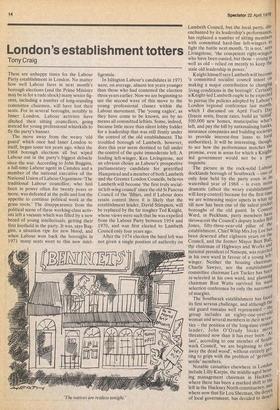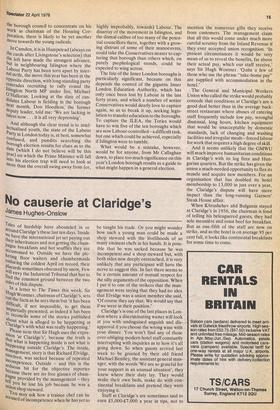London's establishment totters
Tony Craig
These are unhappy times for the Labour Party establishment in London. No matter how well Labour fares in next month's borough elections (and the Prime Minister may be in for a rude shock) many senior figures, including a number of long-standing committee chairmen, will have lost their seats. For in several boroughs, notably in Inner London, Labour activists have ditched their sitting councillors, going instead for young professional whizzkids to fly the party's banner.
The move away from the weary 'old guard' which once had Inner London to itself, began some ten years ago, when the 1968 borough elections all but wiped Labour out in the party's biggest debacle since the war. According to John Baggins, a full-time Labour agent in Camden and a member of the national executive of the National Union of Labour Organisers: 'The traditional Labour councillor, who had been in power often for twenty years or more, was defeated at the polls and lost the appetite to continue political work at the grass roots.' The disappearance from the political scene of these working-class activists left a vacuum which was filled by a new breed of young intellectuals, getting their first foothold in the party. It was, says Baggins, a situation ripe for new blood, and when Labour won back the boroughs in 1971 many seats went to this new intel
ligentsia.
In Islington Labour's candidates in 1971 were, on average, almost ten years younger than those who had contested the election three years earlier. Now we are beginning to see the second wave of this move to the young professional classes within the Labour movement. The 'young eagles', as they have come to be known, are by no means all committed leftists. Some, indeed, became little more than silent lobby fodder for a leadership that was still firmly under the control of the old establishment. The troubled borough of Lambeth, however, does this year seem destined to fall under the control of the quite immoderate left. A leading left-winger, Ken Livingstone, not an obvious choice as Labour's prospective parliamentary candidate for gentrified Hampstead and a member of both Lambeth and the Greater London Councils, believes Lambeth will become 'the first truly socialist left-wing council' since the old St Pancras Council of the 'fifties, and if Labour does retain control there it is likely that the establishment leader, David Stimpson, will be replaced by the far tougher Ted Knight, whose views were such that he was expelled from the Labour Party between 1954 and 1970, and was first elected to Lambeth Council only four years ago.
After the 1974 election the hard left was not given a single position of authority on
Lambeth Council, but the local party, dis' enchanted by its leadership's performance,
has replaced a number of sitting members with committed hard-line left-wingers to fight the battle next month. 'It is not,' says Livingstone, 'the competent right-wingers who have been ousted, but those — young as well as old — relied on merely to keep the stale old leadership in power.'
Knight himself says Lambeth will become 'a committed socialist council intent ori making a major contribution to changing living conditions in the borough'. Certain a Knight-led Lambeth ought to be expected to pursue the policies adopted by Labour's London regional conference last month, which I discussed on April Fool's Da?' (freeze rents, freeze rates, build an 500,000 new homes, municipalise what's left, and pay the bill by nationalising banks, insurance companies and building societies to provide interest-free loans to local authorities). It will be interesting, though, to see how the performance matches the promise, even in areas for which a Knight' led government would not be a pre' requisite. The picture in the rock-solid Labour docklands borough of Southwark — one of only four held by the party even in its watershed year of 1968 — is even more dramatic (albeit the weary establishment will keep control) because for the first tittle we are witnessing major upsets in what UP till now has been one of the safest pocket boroughs of the old guard. In Consort Ward, in Peckham, party members have, thrown out the Council's deputy leader Bih Jones, fifty-three-year-old pillar of the establishment. Chief Whip Mrs Joy Lee hos been deserted after eighteen years on th„e Council, and the former Mayor Bert Ball; the chairman of Highways and Works arw, national president of Natsopa, was reject in his own ward in favour of a young leftwinger. Neither the housing chairman' Charlie Sawyer, nor the establishment committee chairman Len Tucker has been re-selected in his own ward, and planningd chairman Ron Watts survived his selection conference by only the narrows of margins. The Southwark establishment has faCits first serious challenge, and although the old guard remains well represented — group includes an eighty-one-year-oil.' woman and several members in their seven; ties — the position of the long-time council leader, John O'Grady looks M°rAct threatened now than it has ever beefl. last', according to one member of Soutil; wark Council, 'we are beginning to clef away the dead wood', without entirely Se,. ting to grips with the problem of .geriatric senile' members. Notable casualties elsewhere in London include Lilly Karpin, the middle-aged hot's' ing management chairman in HackneY' where there has been a marked shift to Ode left in the Hackney North constituency, all., where now that Sir Lou Sherman, the doYe'; of local government, has decided to deser
the borough council to concentrate on his work as chairman of the Housing CorPoration, there is likely to be yet another Move towards the young radicals.
In Camden, it is in Hampstead (always on the cards after Livingstone's selection) that he left have made the strongest advance, but in neighbouring Islington where the Labour Party has been torn apart by internal strife, the move this year has been in the 4Posite direction, with long-standing party comrades recruiting to rally round the Islington North MP under fire, Michael 9'llalloran. Looking at the slate of candidates Labour is fielding in the borough next month, Don Hoodless, the former deputy leader, told me: 'We are lacking in talent now. . . it is all very depressing'.
And although the clear trend is to intellectualised youth, the state of the Labour Party in London today is, at best, somewhat confused, and pundits searching the borough election results for clues as to the date (which I do not believe will be this Year) on which the Prime Minister will fall Into his election trap will need to look at more than the overall swing away from (or,
highly improbably, towards) Labour. The disarray of the movement in Islington, and the dismal calibre of too many of the potential councillors there, together with a growing distrust of some of their manoeuvres, could take the Conservatives nearer to capturing that borough than others which, on purely psephological trends, could be expected to wing across.
The fate of the Inner London boroughs is particularly significant, because on this depends the control of the gigantic Inner London Education Authority, which has only once been lost by Labour in the last forty years, and which a number of senior Conservatives would dearly love to capture again, so as to break it up, seeking legislation to transfer education to the boroughs. To capture the ILEA, the Tories would have to win five of the ten boroughs which are now Labour-controlled—a difficult task, but one which could be achieved, especially if Islington were to tumble.
What would be a mistake, however, would be for anyone, from Mr Callaghan down, to place too much significance on this year's London borough results as a guide to what might happen in a general election.



































 Previous page
Previous page